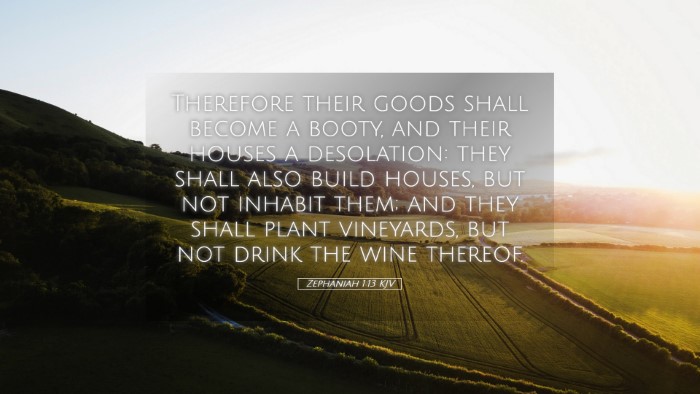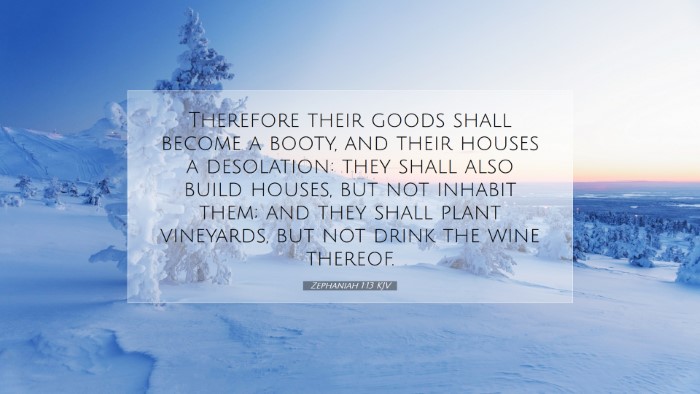Old Testament
Genesis Exodus Leviticus Numbers Deuteronomy Joshua Judges Ruth 1 Samuel 2 Samuel 1 Kings 2 Kings 1 Chronicles 2 Chronicles Ezra Nehemiah Esther Job Psalms Proverbs Ecclesiastes Song of Solomon Isaiah Jeremiah Lamentations Ezekiel Daniel Hosea Joel Amos Obadiah Jonah Micah Nahum Habakkuk Zephaniah Haggai Zechariah MalachiZephaniah 1:13
Zephaniah 1:13 KJV
Therefore their goods shall become a booty, and their houses a desolation: they shall also build houses, but not inhabit them; and they shall plant vineyards, but not drink the wine thereof.
Zephaniah 1:13 Bible Commentary
Commentary on Zephaniah 1:13
Verse: Zephaniah 1:13 - "Therefore their goods shall become a booty, and their houses a desolation: they shall also build houses, but not inhabit them; and they shall plant vineyards, but not drink the wine thereof."
Overview
This verse encapsulates the theme of divine judgment and the futility of material pursuits in the face of God’s impending discipline. The prophet Zephaniah shares a sobering message that highlights the consequences of Israel's disobedience and their imminent downfall due to sin.
Contextual Analysis
Zephaniah prophesied during the reign of King Josiah, a time characterized by religious corruption and idolatry in Judah and Jerusalem. The prophet's message is a clarion call to return to the covenant faithfulness expected of God's people. In the verses leading up to 1:13, Zephaniah lays out the reasons for God's judgment, focusing on the wickedness prevalent within the nation.
Theological Implications
Zephaniah 1:13 serves as a powerful reminder of the temporal nature of worldly possessions. The verse indicates that despite efforts to cultivate and build, the ultimate inability to enjoy these blessings signifies a divine curse. This reflects a broader theological theme: when God's people stray from His ways, He allows them to experience the consequences of their choices.
Commentary Insights
Matthew Henry's Commentary
Matthew Henry emphasizes that this verse illustrates the judgment that befalls those who turn away from God. He notes, "They that promised themselves abundance shall have their goods spoil'd, and that though they build houses, they shall not dwell therein." Henry underscores the irony of laboring for what one ultimately cannot enjoy, illustrating a principle of divine justice.
Albert Barnes' Notes on the Bible
Albert Barnes interprets the phrase "their goods shall become a booty" as an indication that the possessions accumulated without regard for God's commands will ultimately be taken away. He comments, "The destruction of their houses would follow the destruction of the state, as the crops of the field would follow the destruction of the people." Here, Barnes connects physical destruction with spiritual decay, highlighting a prophetic warning that transcends mere historical context.
Adam Clarke’s Commentary
Adam Clarke provides a critical examination of the phrase "they shall also build houses, but not inhabit them." He suggests that this is an expression of frustration that accompanies God’s judgment. "Their efforts will be in vain," he writes, indicating that despite humanity's best efforts, divine will prevails. Clarke adds that this reflects a broader scriptural motif where judgment results in the cessation of blessings for those who are disobedient.
Practical Applications
The exhaustive judgment that falls on the people portrayed in Zephaniah 1:13 serves as a timely warning for contemporary readers. The admonition is clear: the pursuit of material wealth without spiritual fidelity leads to despair. Pastors, students, and theologians can draw from this powerful admonition as they teach and explore the implications of living a life centered around God’s will.
- Emphasizing Repentance: The need for repentance in the face of decadence and spiritual decline is crucial. Zephaniah’s message encourages self-examination.
- Lamenting the Futility of Materialism: This verse invites believers to contemplate their relationship with material goods and societal engagement, recognizing that lasting satisfaction comes only from fidelity to God.
- Encouraging Faithfulness in Ministry: For those in ministry, this text serves as a reminder of the importance of remaining faithful to divine calling over cultural pressures.
Conclusion
In Zephaniah 1:13, we find a potent illustration of the effects of sin and a profound reminder of God's sovereign control over all aspects of life. The collective insights from Matthew Henry, Albert Barnes, and Adam Clarke reinforce the significance of returning to the heart of God’s covenant. By understanding the gravity of this prophetic message, we are encouraged to seek first the kingdom of God, ensuring that our lives reflect His glory rather than the fleeting treasures of this world.


